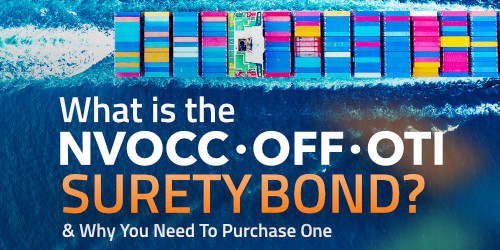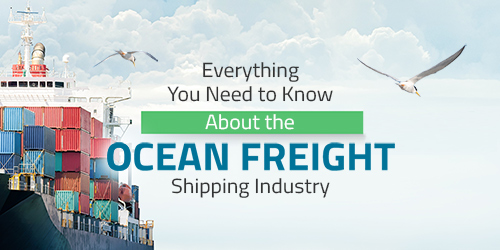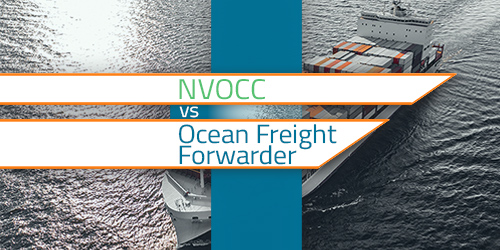Types of Federal Maritime Commission Bonds
Can't find what you're looking for? Let us help!
Get Started » or, if you'd prefer, call us at
(No obligation, takes 2 minutes)
How Does the FMC Classify Ocean Transportation Intermediaries (OTIs)?
Ocean Transportation Intermediaries (OTIs) are classified as either Ocean Freight Forwarders (OFFs) or Non-Vessel-Operating Common Carriers (NVOCCs) and are regulated by the FMC pursuant to the Shipping Act of 1984.
An Ocean Freight Forwarder (OFF) is defined by the FMC as an individual or company located in the U.S. that:
- arranges cargo movement to an international destination
- dispatches shipments from the United States via common carriers and books or otherwise arranges space for those shipments on behalf of shippers
- prepares and processes the documentation and performs related activities pertaining to those shipments
Before commencing operations in the United States Trades, OFFs are required to obtain an OTI license from the FMC (46 CFR § 515.3) and submit a surety bond or other accepted proof of financial responsibility.
A Non-Vessel-Operating Common Carrier (NVOCC) is defined by the FMC as an individual or company that:
- holds itself out to the public as a common carrier to provide ocean transportation, issue its own house bill of lading or equivalent document, and does not operate the vessels by which ocean transportation is provided
- is a shipper in its relationship with the vessel-operating common carrier involved in the movement of cargo
Before commencing operations in the United States Trades, NVOCCs are required to obtain an OTI license from the FMC (46 CFR § 515.3), submit a surety bond or other accepted proof of financial responsibility, and publish a tariff (46 CFR § 520.3).
How Do I Apply for an OTI License?
An OTI license from the FMC is required for U.S.-based companies or sole proprietors operating as Ocean Freight Forwarders (OFF) or Non-Vessel-Operating Common Carriers (NVOCCs). Licensing is optional for Non-U.S.-based NVOCCs.
U.S. based NVOCCs and OFFs application process:
- Appoint a qualifying individual who has at least three years of "demonstrable" OTI experience in the United States and who is either an officer of the applicant's corporation, the sole proprietor, or a partner in a partnership.
- Submit electronically or print out and complete an application for a License as an Ocean Transportation Intermediary (Form FMC-18).
- Provide a surety bond (FMC-48) or other proof of financial responsibility.
- Pay the required license application fee.
Non-U.S.–based NVOCCs application process:
- Appoint a qualifying individual who has at least three years of "demonstrable" OTI experience in the United States and who is either an officer of the applicant's corporation, the sole proprietor, or a partner in a partnership.
- Submit electronically or print out and complete an application for a License as an Ocean Transportation Intermediary (Form FMC-18).
- Provide a surety bond (FMC-48) or other proof of financial responsibility.
- Pay the required license application fee.
- Establish a presence in the United States such as an unincorporated branch office.
In order to make changes to your information including qualifying individual, name, address, business structure change, additions or removals of trade names, and other changes to information reported on the original Form FMC-18, you will need to file the Form FMC-18.
What Are the Surety Bond Requirements?
NOTE: In accordance with Federal Maritime Commission (FMC) requirements, all of our Surety Bonds Direct partner underwriting companies are acceptable to the U.S. Department of Treasury.
Licensed, U.S.-based NVOCCs and OFFs must submit proof of financial responsibility (most commonly in the form of a surety bond), in a coverage amount of $50,000 for an Ocean Freight Forwarder license or $75,000 for NVOCC license. The FMC also requires addresses for each unincorporated branch office in the United States performing OTI services.
Licensed, Non-U.S.-based NVOCCs must submit proof of financial responsibility in the amount of $75,000.
Non-U.S.-based NVOCCs, unless licensed, must submit proof of financial responsibility in the amount of $150,000 and are required to use a licensed OTI for any OTI services performed on its behalf in the United States.

What Does the FMC OTI Surety Bond Protect Against?
The FMC-48 Ocean Transportation Intermediary (OTI) Bond for NVOCCs or Freight Forwarders is written to provide evidence of financial responsibility for OTIs (46 CFR part 515) and guarantee compliance with Section 19 of the Shipping Act (46 U.S.C. 40901-40904), and the rules and regulations of the Federal Maritime Commission. This bond is furnished by entities operating as OTIs in the waterborne foreign commerce of the United States in accordance with the Shipping Act of 1984, 46 U.S.C. 40101-41309.
The surety bond covers payments for judgments obtained or settlements made related to a valid claim for damages under 46 CFR 515.23 against the bonded principal arising from transportation-related activities under the Shipping Act, an order for reparations issued pursuant to section 11 of the Shipping Act, or a penalty assessed against the principal pursuant to section 13 of the Shipping Act (46 U.S.C. 41107-41109) to the benefit of the Federal Maritime Commission.
The surety bond shall not cover shipments of used household goods and personal effects for the Department of Defense or the federal civilian executive agencies shipping under the International Household Goods Program administered by the General Services Administration.
How Much Does an OTI Surety Bond Cost?
The surety bond premium for a Federal Maritime Commission bond depends on a combination of the following factors:
- The total OTI bond coverage amount required by the FMC
- The type of OTI bond (OFF, US NVOCC, or non-US NVOCC)
- The credit score and credit history of the qualifying individual
- The OTI license history of the qualifying individual
For more information about how factors like credit score affect your OTI surety bond cost, and to learn how Surety Bonds Direct can get a more affordable bond cost for your OTI business, see our guide to surety bond costs. We also offer surety bond premium financing that can help your business spread out the cost of its ocean transportation intermediary bonds.
Ready to purchase your OTI surety bond? Get started now with a no-obligation free quote on your OTI bond from Surety Bonds Direct.

NVOCC Bond And OTI Bonding Requirements
Getting your OTI license? Learn about the NVOCC bond and all of the OTI bonding requirements including OFF bonds. Watch this video now!

Everything You Need to Know About the Ocean Freight Shipping Industry
From cars to toys to industrial chemicals to food, the goods that consumers rely on every day often arrive via ocean freight shipping.

How to Become a Licensed Ocean Freight Forwarder
What does an ocean freight forwarder do, and how does a business become licensed as an ocean freight forwarder? Find out the answers.

Key Differences Between Freight Brokers and Freight Forwarders
Both freight brokers and freight forwarders help arrange the transportation of cargo, but they do it via different methods and occupy different niches in the freight industry.

NVOCC vs Freight Forwarder: The 5 Major Differences And How To Get Licensed
An NVOCC and Ocean Freight Forwarder may seem the same. But they're difference in 5 major ways. Let's look and learn how to get licensed in both.
Can't find what you need?
Let our bond experts help!
Get Started »
No obligation, takes 2 minutes
If you'd prefer, call us at


